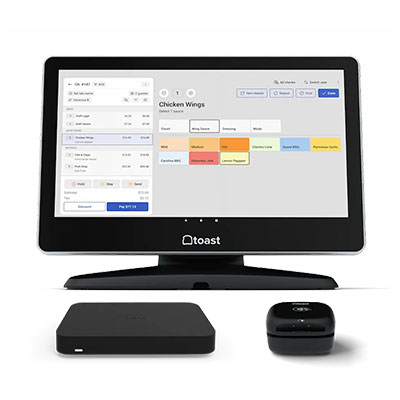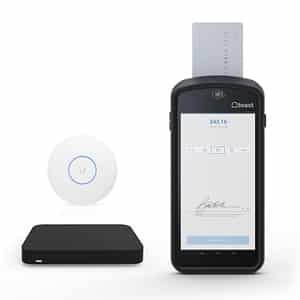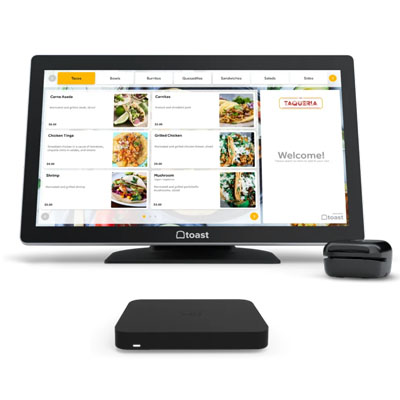I evaluated over 18 POS systems across 32 data points and leveraged hands-on testing and real-world experience to determine the best POS systems for 2025.
Best POS Systems for Small Businesses for 2025
This article is part of a larger series on POS Systems.
The best point-of-sale systems for small businesses include robust tools for sales and inventory tracking, employee management, and customer loyalty. Most importantly, they are easy to use and reliable. Most small businesses can get started with free POS software and a simple tablet or mobile setup. However, businesses with operational complexities or robust inventories may need a system that costs $100-plus per month.
Based on my hands-on testing and experience, the best POS systems are as follows:
- Square: Best overall and best free
- Shopify: Best for retail and ecommerce
- Toast: Best restaurant POS
- Clover: Best for mobile sales
- Lightspeed: Best for inventory management
- KORONA POS: Best payment processor-agnostic POS
Best POS Systems of 2025 Compared
Supported Business Types | Minimum Monthly Fee | Payment Processing | Supported Platforms | |
|---|---|---|---|---|
 | Mobile, storefront, retail, restaurants, beauty, and more | $0 | Square Payments | Apple & Android tablets and smartphones, Square hardware |
 | Retail, wholesale, ecommerce | $5 | Apple & Android tablets and smartphones | |
 | Restaurants. QSRs, bars, food trucks, cafes, ghost kitchens | $0 | Toast Payments | Toast hardware |
 | Mobile, retail, QSRs, professional services | Choice of processor on Fiserv network | Apple & Android tablets and smartphones, Clover hardware | |
 | Retail, restaurants, golf courses, hospitality | $109 | Lightspeed Payments or third-party | Desktop browse, Apple iPads, |
 | Retail and niche industries | $59 | Third-party | Windows or Linux desktop application |
Why You Can Trust My Recommendations
Square: Best Overall

Pros
- Free POS
- Easy to use, fast set-up
- Able to grow with your business
Cons
- Locked into Square for payment processing
- Limited phone support
- Limited customization options, limited in-depth reporting
Overview
Square is the best POS system for most small businesses because of its affordable price point, mobile capabilities, and POS tools for retailers, restaurants, and service industries.
All of Square’s POS systems―General, Retail, Restaurants, and Appointments―offer a free subscription plus an online store platform. There are additional premium plans to support growth, all ranging from $29 to $60 per month.
Square also tops our lists of the following:
- Forever-free plan: Square is free to sign up, free to use, and doesn’t impose any limits on sales, products, or users.
- User-friendliness: Its touch-screen, app-based software is intuitive for business owners and employees alike, ensuring fast training and smooth transactions.
- Scalability: Square offers an entire ecosystem of business software including payroll, marketing, and more, available as modular add-ons so you can add what you need when you need it.
- Popular and affordable hardware: Square regularly makes our lists of the best credit card readers and leading POS cash registers. Its systems offer great value for what you pay and are widely available from major retailers.
- Monthly software fees: $0 to $165
- Installation fee: $0, installation is do-it-yourself (DIY)
- Contract length: Month to month
- Processing fees:
- In-person: 2.6% + 10 cents
- Online: 2.9% + 30 cents
- Keyed-in: 3.5% + 15 cents
- Custom rates available for businesses processing more than $250,000 annually
Add-ons for marketing, payroll, shift scheduling and team communications, loyalty programs, and more.
Square’s POS solutions are only compatible with Square Payments. When you create a free Square account you’re automatically set up for both POS and payment processing.
However, Square does not work with high-risk businesses other than CBD businesses on a case-by-case basis. So, make sure Square Payments is a good fit before committing to Square POS.
Read more in our Square Payments review.
If you have a high-risk business or want the ability to choose your own processor, consider Lightspeed, Clover, or KORONA.
Square Terminal | Square Register | Square Stand |
|---|---|---|
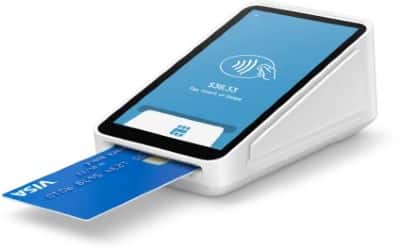 | 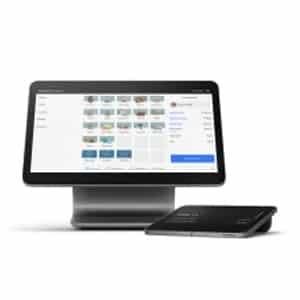 | 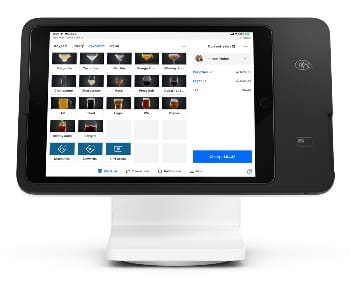 |
$299 or $27 per month for 12 months | $799 or $39 per month for 24 months | $149 or $14 per month for 12 months |
Stand-alone mobile POS that can take orders, accept card payments and issue receipts. | Full POS with touch-screen monitor, detachable customer-facing display, and credit card machine | All-in-one credit card machine with POS, and built-in card reader |
In addition to the hardware options above, you can download the Square app on any iPhone or iPad and key in payments or connect a card reader.
Square has an open API and SDK for creating custom integrations. However, Square has a full app marketplace with hundreds of out-of-the-box integrations, including the following:
- 7Shifts
- Acuity
- Chowly
- DoorDash
- Faire
- GoDaddy
- Homebase
- Jotform
- Mailchimp
- MarginEdge
- MarketMan
- Odeko
- OpenTable
- Printful
- QuickBooks
- Setmore
- Shippo
- ShipStation
- Slice
- Thrive Inventory
- UberEats
- Wix
- WooCommerce
- Xero
- Zapier
- Zoho Books
Want to learn more about what it’s like using Square as a POS system? Check out my full Square Register video review:
Shopify: Best for Retail & Ecommerce

Pros
- Smart omnichannel and inventory tools
- Social media selling
- Easy to use; intuitive interface
- Best-in-class ecommerce platform
Cons
- Offline mode can be glitchy
- Free POS has limited features
- Not compatible with high-risk businesses
Overview
Shopify POS is the best POS system for small business that either already use a Shopify ecommerce store or are looking to sell online and in person. With Shopify, you can opt for either the standalone POS product, which comes with a very basic online store, or combine Shopify POS with Shopify’s ecommerce solution for a true omnichannel setup.
Shopify is known primarily for its online selling tools, with a robust ecommerce platform and integrations for selling on your social channels. However, its point-of-sale product is equally as impressive. This POS outscored the others on this list for its register features, including a customizable checkout interface, flexible payment options, and offline selling.
Shopify also tops the list in our guides to:
- Smart inventory: Real-time, cross-channel and location visibility, low stock reports, demand forecasting, inventory analysis, purchase orders and receiving, markdown suggestions, and more.
- Omnichannel sales: One central data center for all sales lets you offer customer experiences like in-store pickup, buy online exchange in-store, local delivery, and more. Plus, you can access ecommerce tools, like order fulfillment, directly from the POS.
- Social media selling: Shopify has partnerships with most social media platforms including Facebook, Instagram, TikTok, and Pinterest, making it easy to sync your product catalog and sell to customers directly on those channels.
- Robust register tools: Shopify POS is feature-rich with customizable tiles and layouts, optional checkout validation, buy now, pay later (BNPL) payments, customizable payment types like IOUs, customizable receipts, returns and exchanges, and more.
Of course, one of the best parts of using Shopify POS is that it syncs seamlessly with your Shopify online store.
- Monthly software fees:
-
- POS: $5 to $89 per location
- Ecommerce (optional): $39 to $399
- If you subscribe to an ecommerce plan, you receive Shopify Lite POS for free. However, if you have a brick-and-mortar location, we recommend upgrading to POS Pro at $89 per month.
- Installation fee: $0, installation is DIY
- Contract length: Options for month-to-month, annual, or multiyear
- Processing fees:
-
- In-person: 2.4% + 10 cents to 2.6% + 10 cents
- Online: 2.5% to 2.9% + 30 cents
Learn more about Shopify’s fees and how much it costs to run your business using Shopify.
Like most of our recommended POS, Shopify has a built-in payment processor called Shopify Payments, which is the only payment processor compatible with Shopify POS.
Its rates are fairly standard, and it has data encryption and Payment Card Industry (PCI)-compliant servers. Learn more in our Shopify Payments review.
However, if you also have a Shopify online store, you can use third-party processors for ecommerce transactions for an additional fee.
Note that, like Square, Shopify is not compatible with high-risk businesses because the payment services it provides are aggregated, meaning that merchants don’t receive a dedicated merchant account, and therefore Shopify has a low risk tolerance. So, if your business is considered high-risk, choose an option like KORONA, Clover, or Lightspeed that offers a choice of payment processor.
Shopify POS is app-based and works on iOS and Android devices, including iPhone 7 or higher, iPad Air Gen 2 or higher, iPad Gen 5 or higher, iPad mini Gen 4 or higher, all iPad Pro models, and Android devices running version 10.0 or higher.
Card readers, iPad stands, and other accessories like cash drawers and barcode scanners can all be purchased through Shopify, including the following:
Tap and Chip Reader | Countertop Kit | Shopify Terminal |
|---|---|---|
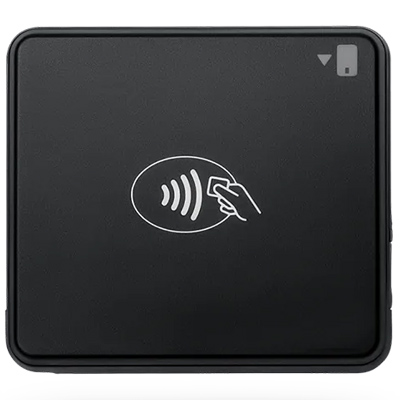 | 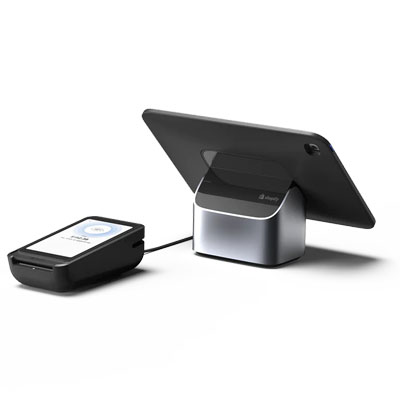 | 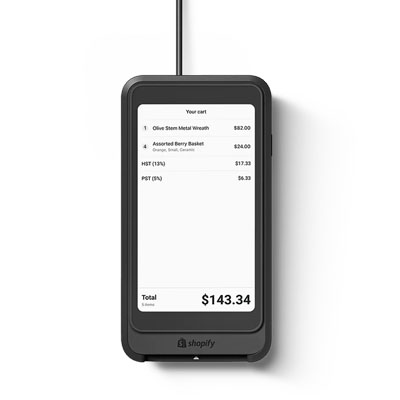 |
$49 | $459 or $114.75 bi-weekly for 2 months | $349 or $87.25 bi-weekly for 2 months |
Securely accept tap, chip, and swipe payments, all fully integrated with Shopify POS. Available for iOS only. Dock available for $40 (in-store use) | Tablet stand and card reader terminal for a full countertop setup. Options available for Android and iOS (tablet sold separately). | Customer-facing display and card reader meant to be paired with a tablet POS. |
Shopify has over 13,000 apps in its ecosystem, including the following:
- AfterShip
- DSers
- Faire
- Judge.me
- Klaviyo
- Mailchimp
- Pagefly
- Pop Convert
- Printful
- Privy
- QuickBooks
- Shippo
- ShipStation
- Spocket
- Stocky
- UpPromote
- Xero
- Zendrop
Want to see Shopify POS in action? Check out our setup tutorial:
Toast: Best Restaurant POS

Pros
- Free starter POS
- Pay-as-you-go plans
- Robust workforce management
- Automated tip pool management
- Flexible online ordering and delivery tools
Cons
- Locked into Toast for payment processing
- Two-year contract
- Operates on proprietary hardware
- Many features only available in pricier plans
Overview
Toast is a powerhouse cloud-based POS built specifically for the restaurant industry. With a free starter POS and pay-as-you-go options for hardware, small restaurants can start with Toast for no upfront cost and increase their POS footprint as their businesses grow.
At the same time, enterprise-level restaurants will feel supported by Toast’s integrated online ordering, delivery management, marketing, and employee management tools. This is why we love Toast for both new and growing restaurants.
Toast is our top choice for:
- Restaurant POS Systems
- Pizzeria POS
- Delivery POS
- Bar POS System
- Free POS: Toast offers a free starter plan for $0 upfront and $0 per month that includes both a hardware kit for a single terminal and cloud-based POS software.
- Flexibility: Like Square, Toast has a robust ecosystem of products that can be adapted to fit the needs of almost any food and beverage business (cafes, food trucks, QSRs, ghost kitchens—you name it). However, unlike Square, Toast is purpose-built specifically for restaurants.
- Online ordering and delivery: Toast has outstanding native tools for collecting online orders, managing deliveries, connecting with third-party delivery apps, and setting up a branded website or mobile app.
- Multilingual settings: Certain Toast customers have access to settings to adjust specific users or functions (like kitchen tickets) to English, Spanish, or Chinese.
Since Our Last Update In 2024, Toast launched Benchmarks, which leverages all of the transaction data on its 127,000-plus restaurant network to show how your business is performing against similar businesses.
- Monthly software fee: $0 to $69 or custom quote
- Installation fee: Optional; starting at $250
- Contract length: Two years
- Processing fees:
- In-person:
- Pay-as-you-go: 3.09% + 15 cents
- Standard: 2.49% + 15 cents
- Online:
- Pay-as-you-go: 3.09% + 15 cents
- Standard: 3.50% + 15 cents
- Custom rates available for high-volume businesses
- In-person:
Modular add-ons for payroll, mobile ordering, employee scheduling and communications, marketing, digital storefront, and accounting tools.
Toast offers built-in payment processing, Toast Payments, which is required for using its POS.
Toast Payments comes with data encryption, fraud monitoring, an offline mode, and rapid payout options. It can also be used to accept payments tableside, online, and via kiosk.
Compared with others on this list, Toast’s processing fees are more expensive. However, the overall value the system offers is still well worth it, in my opinion.
That said, if you want a processor that offers custom rates, consider Square for Restaurants, Lightspeed Restaurant, or Clover via a third party.
All of Toast’s hardware is industry-grade and IP-rated to withstand steam and dust intrusion. Toast handheld terminals, including the popular Toast Go 2, are drop-tested to withstand a restaurant environment.
In addition to its native add-on modules, Toast has dozens of integrations available via its API program, including the following:
- 7 Shifts
- BackBar
- Butter
- Chowly
- DoorDash
- Grubhub
- Homebase
- Klaviyo
- MarginEdge
- MarketMan
- NEXT
- OpenTable
- Resy
- Restaurant365
- Shipday
- TapMango
- Tock
- Uber Eats
- xtraCHEF
- Yelp
Clover: Best for Mobile Sales

Pros
- Month-to-month contracts
- Built-in payment processing
- Variety of LTE and Wifi-enabled hardware
Cons
- Contract terms and processing rates vary by reseller
- Inventory management requires third-party integration
- The reseller network can be tricky to navigate
Overview
Clover is a mobile-friendly cloud POS system owned by payment network Fiserv. Any merchant services provider that operates on the Fiserv network can sell the Clover POS with its merchant services software built in. Many small businesses purchase their Clover POS systems from their bank, or directly from their preferred merchant services provider.
The Clover POS operates on Clover-built hardware, which is designed to be light, mobile, and industry-grade to withstand high-volume use. Nearly all Clover hardware can communicate via cellular LTE signals or Wi-Fi, making this system a terrific pick for mobile businesses needing robust POS tools. Just take care with your contract terms; the various resellers can have widely varying terms of service for their customer support, contract length, and processing fees.
Clover’s many different options when it comes to business setup, contract terms, and merchant service providers make it less straightforward than others on this list. However, it does provide better customization and flexibility to fit various business needs.
- Popular, reliable card readers: Choose from a variety of highly rated mobile and countertop hardware.
- Payment processing tools: Virtual terminal, invoicing, scan-to-pay, store credits, layaways, gift cards, and BNPL options.
- CRM and marketing: Set up customer profiles, create a data-driven rewards program, prompt customers who haven’t returned in a while with a promotion, collect customer feedback, and more.
- Easy to use software: Overall, the software is intuitive, easy to use, and highly customizable to suit different businesses.
Clover fees are more complex than other providers on this list. In addition to separate pricing tiers for retailers and restaurants, Clover also offers subscriptions that combine the cost of hardware and software into a single monthly fee. You can see an even more detailed breakdown of Clover pricing in our Clover POS review.
Here is the current pricing if you purchase Clover through its website:
- Monthly software fees: $0 to $129.85
- In-person processing fees: 2.3% to 2.6% + 10 cents
- Online processing fee: 3.5% + 10 cents
As mentioned earlier, Clover is owned by Fiserv. In addition, while you can purchase the system directly from the Clover website, you can also purchase the system from any reseller on the Fiserv network.
In other words, you can shop around to find your preferred payment processor and purchase Clover from them. Instead of all of the other systems on this list (except KORONA), where you purchase the software and that dictates the processor.
Just take care with your contract terms; the various resellers can have widely varying terms of service for their customer support, contract length, and processing fees.
Clover Go | Clover Flex | Clover Compact |
|---|---|---|
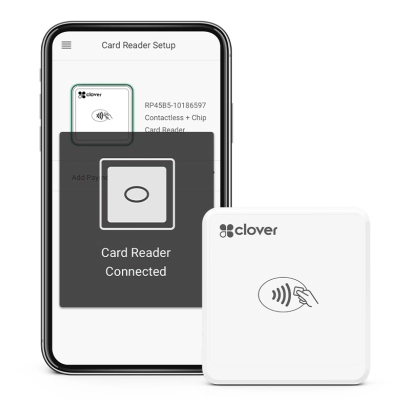 | 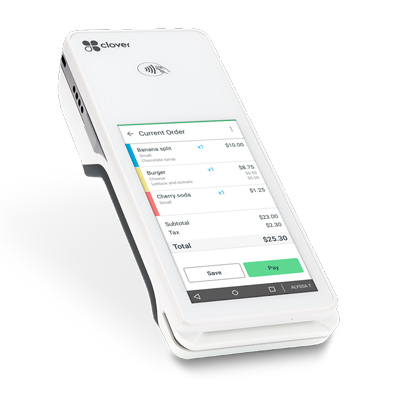 | 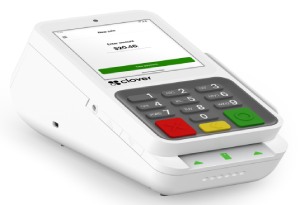 |
$49 | $599 | $279 |
Cellular-enabled mobile tap, dip, and chip card reader that integrates with most smartphones | Wi-Fi and LTE-compatible handheld POS Terminal | Accepts swipe (MSR), chip (EMV + signature), and contactless (NFC) payments with built-in receipt printer |
Clover Mini | Clover Station Solo | Clover Station Duo |
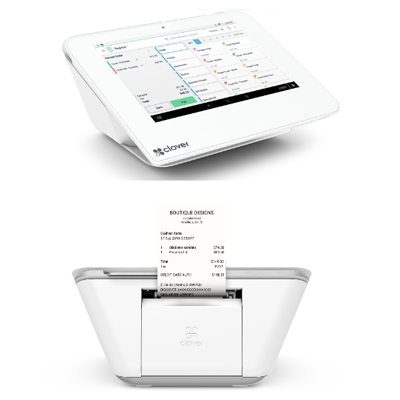 | 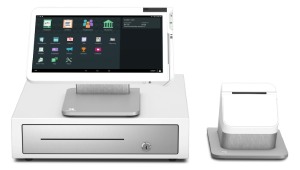 | 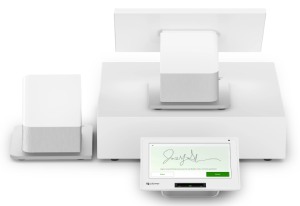 |
$799 | $1,699 | $1,799 |
Low profile, all-in-one POS display, payment terminal, and receipt printer | Contactless card reader, single screen, receipt printer, cash drawer, camera & scanner | Contactless card reader, dual screen, receipt printer, cash drawer, camera & scanner |
Each device after your first one adds an additional monthly fee, except for Go readers. The specific rate varies by your software plan.
Since Our Last Update:
Clover released Clover Flex Pocket, which is 25% lighter than the original Clover Flex, yet still has barcode scanning and all-day battery life. Furthermore, it has a larger screen than the original Flex.
Like Square, Clover has an entire app ecosystem with solutions including the following:
- 7Shifts
- Gusto
- Menufy
- Paychex
- QuickBooks
- Shopify
- Thrive Inventory
- WooCommerce
- Yelp
Clover also has native add-ons for features like shift scheduling and time off management, customer loyalty and rewards programs, promotions, customer management, and more.
Lightspeed: Best POS for Inventory Management

Pros
- 14-day free trial
- Detailed analytics tools
- Robust, integrated ecommerce platform
- 24/7 customer support and onboarding
- Granular matrix inventory management
Cons
- User interface can take time to learn
- Pricey
- Shipping integrations are limited
Overview
Lightspeed Retail is the best retail POS system for businesses with large or complex inventories, including specialty shops needing to manage custom orders. The software lets retailers create product bundles, categorize with multiple variants, and manage purchase orders with a built-in catalog. Lightspeed also features one of the most sophisticated analytics platforms for small businesses.
In addition, Lightspeed offers a restaurant POS, which also has robust, automated inventory management including ingredient-level tracking and “1-click” vendor orders that you can place right from the Lightspeed dashboard.
Lightspeed is also our top recommendation for:
Over the past several years, Lightspeed has acquired several other POS systems, including ShopKeep, Vend, and Upserve. Lightspeed has baked many of the features from these products into its offerings and, at the time of publication, still offers versions of these products.
Lightspeed has also acquired Ecwid, a popular shopping cart platform, to improve its native ecommerce tools, which are free for certain POS plans.
- Inventory management: Granular, matrix, inventory management with many variant options, built-in purchase ordering, kitting/bundling, and serial and SKU tracking.
- Robust analytics: Over 50 preset reports, including data visualizations and tips on actionable insights.
- B2B catalog and supplier management: More than 3,000 preloaded vendor catalogs, vendor tracking, automated vendor returns, and integrated supplier network.
- Marketing and loyalty: Auto customer segmentation, flexible point-based loyalty programs, integrated email marketing, customer habit tracking, and more
- Native ecommerce: Over 30 themes to choose from, able to sync your online and in-store products and sales, integrated SEO and shipping tools.
- Monthly software fees:
-
- $109 to $339 ($89 to $289 paid annually) for retail
- $189 to $399 for restaurants
(varies by POS type, payment processor, and payment plan)
Lowest rates available with annual billing
- Installation fee: $0
- Contract length: One year
Processing fees:
- In-person: Lightspeed Payments: 2.6% + 10 cents; other processors vary
- Online: Lightspeed Payments: 2.6% + 30 cents; other processors vary
- Custom processing rates available with certain plans and sales volumes
Like Square, Shopify, and Toast, Lightspeed has built-in payment processing that is the default option when you choose Lightspeed POS. However, certain versions of Lightspeed are compatible with third-party payment processors, meaning it is possible to choose your own payment processor with Lightspeed, especially if your business is considered high-risk.
However, note that Lightspeed may charge higher monthly fees if you use a third-party processor.
Lightspeed runs on iPads and desktop computers. All Lightspeed hardware is quote-based. You can purchase the terminals, card readers, and other accessories you need directly from Lightspeed.
Lightspeed has dozens of integrations. Lightspeed also has several different versions of its retail and restaurant POS. Not all integrations are compatible with each version, so make sure to do your due diligence.
Some available options include the following:
- 7Shifts
- BigCommerce
- BrightPearl
- Drizzly
- Gusto
- Homebase
- Klaviyo
- Mailchimp
- MarketMan
- OpenTable
- Podium
- QuickBooks
- Resy
- Restaurant365
- ShipStation
- ShippingEasy
- Shopify
- SkuVault
- TapMango
- Tock
- Xero
Want to see some of Lightspeed’s inventory tools in action? See our video overview:
KORONA POS: Best for Choice of Payment Processor

Pros
- Choice of payment processor
- Affordable; no long-term contract
- Supports event and ticketing sales
- Loss prevention features
Cons
- Ecommerce site requires WooCommerce integration
- Reporting module has a learning curve
- Limited integrations
- Dated interface
Overview
KORONA is a cloud-based POS that is payment processor agnostic, meaning it can work with any processor of your choosing. This is ideal for businesses wanting to shop around for the lowest rates, or those with special processing needs such as high-risk merchants—vape shops, cannabis dispensaries, and stores that sell a high volume of high-ticket items.
Additionally, it is equipped with ID scanning and includes loss-prevention tools.
This affordable and flexible POS comes with excellent customer support and operates on a variety of desktop and mobile devices, so you likely can use some hardware you already own.
In our evaluation, KORONA earned high marks for the sheer number of business types it supports, from small retail shops to high-risk businesses and ticketed venues. Its ability to integrate with virtually any payment processor also earned it points.
KORONA is a top choice for:
- Robust inventory management: Calculate ideal reorder levels, automate counting schedules, set up or manage multiple product code systems, easily scan or receive products, and print labels and tags.
- Front-end and reporting customizations: Customize your dashboard interface and customer display screen, process returns, schedule promotions, track customers, and more.
- Ticket sales and membership management: Sell and track tickets for individual events, groups, series, seasons, and more, all from the POS.
- Loss prevention tools: Customizable authorization settings for tools like price changes and allowed balance differences, forced cash drawer close, no-sale tenders, and more.
Of course, another standout feature of KORONA POS is its payment processor-agnostic setup, which we discuss below.
- Monthly software fee: $59 to $69
- Installation fee: $0; guided installation and training are included with your KORONA account
- Contract length: Month to month
- Payment processing fees: Varies by processor; KORONA is processor agnostic, so you can use whatever processor you prefer
- Modules available for food and beverage businesses offering tableside service, retailers needing advanced inventory, invoicing, ticketing, franchise management tools, and custom integrations. Additional monthly fees range from $10 to $50 per add-on.
Uniquely, KORONA has an unlimited free trial option. While you can’t integrate a payment processor, and there are low daily transaction limits during the trial, you can take your time with customizations and save all of your data for later.
KORONA is unique on this list because it doesn’t offer any built-in payment solutions. It’s payment processor agnostic. After signing up for the software, KORONA will help you connect your preferred processor.
That means you can shop around for the best rates and contract terms. So, KORONA is a good fit if your business doesn’t qualify for a traditional merchant account or isn’t compatible with a processor like Square, as you can find one that works for you and bring it to KORONA.
KORONA offers a variety of countertop and mobile POS tablets, along with peripherals, including tickets and inventory scanners, cash drawers, and receipt printers. All pricing is custom-quoted. Leasing plans are available, as are payment plans for outright purchases.
KORONA has a few dozen prebuilt integrations, including the following:
- BlockChyp
- CostPlus Processing
- Eagle Processing
- Global Payments
- Sekure
- WooCommerce
You can also submit a request for a new integration.
Methodology: How I Evaluated Each POS System
I started with a list of over 18 best POS systems for small businesses. I then evaluated them by price, POS functions like check and order management, payment processing, and inventory management. I also looked at user reviews and, in many cases, demoed the products firsthand and leveraged my experience using the systems in the past.
All of the systems I evaluated for consideration are as follows:
- Clover
- eHopper
- ePOSNow
- Fresha
- Helcim
- Hike
- IT Retail
- KORONA POS
- Lavu
- Lightspeed
- NCR Silver
- PayPal Zettle
- POS Nation
- Revel Systems
- Shopify
- SpotOn
- Square
- Toast
- TouchBistro
The following POS systems, though previously considered, are now no longer in operation or accepting new sign-ups:
- PayPal Here
- QuickBooks POS
- ShopKeep
- Upserve
- Vend
Click through below to see my full evaluation criteria:
I prioritized POS systems that include a free plan or free trial, affordable subscriptions, and additional plans so that you won’t grow out of the system. I also awarded points to systems with affordable integrated payment processing, flexible hardware options, and no restrictions on the number of users, inventory, and transactions.
Finally, I penalized systems that require long-term contracts and hefty installation fees.
Businesses need speedy and customizable checkout tools, easy customer management, mobility to sell anywhere, a process to track orders, and a way to process online orders. Because the way businesses operate has changed so much in recent years, I also considered contactless payments, integrated online ordering, and omnichannel sales tools.
The most important backend feature I considered was inventory tracking. I also considered how sophisticated and user-friendly the reporting dashboard of each system is and what marketing and employee management tools are available.
I prioritized POS systems with 24/7 phone support, as most small businesses don’t stick to a 9-to-5 schedule. I also considered the installation processes and whether the system has an offline mode or hybrid installation so that you can continue operations when you lose internet access.
Training mode or training videos are also helpful in getting new employees up to speed. But, most importantly, I examined the workflows and interfaces of the systems. Are they intuitive? Is it easy to find and complete daily functions? This weighed heavily in my overall recommendations.
I considered the overall quality of each system’s features, along with system stability, and security. I evaluated whether it offers a good value for its price point and standout features. Finally, I accounted for all of our on-staff experts’ personal experience using each system and interacting with customer service representatives (CSRs), its reviews, and the personal experience of other small business owners.
How Much Does a POS System Cost?
There are three major costs to consider when buying a POS system: hardware fees, software fees, and payment processing fees.
Software fees are typically billed on a monthly or annual basis and can range from $0 to $300 per month per terminal.
Hardware is typically an upfront cost of $250 to $1,000 per terminal, though some POS systems, like Toast and Square, offer financing and payment plan options.
You will also want to consider payment processing fees and whether you will be using a processor that is built into your POS system or a third-party processor.
In addition, though you ideally won’t be switching POS systems anytime soon after making your choice, it is worth noting that some lock you into an initial one- or two-year agreement, whereas others, like Square and Shopify, offer month-to-month plans.
Finally, though most popular POS systems offer free DIY installation, more complex setups will require professional installation, which costs at least $500.
Here’s a rough breakdown of how much each of my recommended systems cost:
POS Pricing Comparison
Base Plan | Advanced Plan | Card-present Transaction Fee | Minimum Hardware Cost | Contract Length | |
|---|---|---|---|---|---|
 | $0 | $89-plus | 2.6% + 10 cents | $59; iPhone card reader | Month-to-month |
 | $5 | $89-plus | 2.6% + 10 cents | $49; iPhone card reader | Month-to-month |
 | $0 | Custom | $0; Pay-as-you-go plan | 2 years | |
 | $0 | $129-plus | $279; Compact terminal | Varies on seller; can be 1-3 years | |
 | $109 | $179-plus | 2.6% + 10 cents | Custom | Month-to-month |
 | $59 | $69-plus | Depends on processor | Custom | Month-to-month |
Important POS Hardware and Software Features
When choosing a POS system, it’s essential to understand the key hardware and software features that will best support your business. Modern POS systems come with a wide range of capabilities, so selecting the right features can streamline operations and improve efficiency. Common features small businesses benefit from include the following:
- Sales tracking: Logs sales and tracks them by product, time, and staff member.
- Payment processing: Handles various payment types, including cash, credit cards, and digital wallets.
- Inventory management: Monitors stock levels, alerts for low stock, and assists with resupply orders.
- Reporting and Analytics: Analyzes sales, discounts, voids, and other data to help identify trends.
- Customer relationship management (CRM): Gathers customer data and logs purchase history for targeted marketing.
- Marketing and loyalty: Offers promotional tools based on customer segmentation.
- Employee management: Tracks staff hours, sales, and tips, with specific permission levels for tasks.
- Ecommerce and multichannel sales: Integrates online sales with physical store data for comprehensive reporting.
- Multistore management: Centralized dashboard for managing multiple locations.
- Third-party integrations: Customizes operations by integrating with software for payroll, accounting, and scheduling.
These features help businesses automate tasks, save time, and improve customer experiences.
How to Choose a POS System for Your Small Business
Choosing the right POS system involves assessing your business’s specific needs, setting a budget, and reviewing potential systems. To make an informed decision:
Step 1: Identify Your Needs
Start by listing the tasks you want the POS system to assist with—like inventory management, sales tracking, or employee scheduling. Focus on features that will enhance your day-to-day operations, streamline processes, and reduce manual effort.
Step 2: Set a Budget
Your next step is to set a budget. You’ll want to consider three types of costs: hardware costs, software fees, and payment processing fees. There are POS systems available at every budget, from $0 upfront and $0 per month, up to the thousands of dollars.
Even with a small budget, you rarely need to skimp on POS software functions. The biggest cost differences come from hardware and the type of installation your POS requires (industry-grade hardware and a locally installed server are the most costly; iPad displays and cloud installation are very affordable).
If you anticipate the ballpark prices below, you’ll rarely be surprised:
- POS upfront cost: $0 to $1,000-plus for hardware and installation
- POS monthly software fees: $0 to $100-plus per month
- Payment processing fees: 2.3% to 4% of credit, debit, and mobile wallet sales
If your budget is tight, you can save money upfront by opting for an iPad POS like Square (which offers a free baseline subscription) or choosing a system that allows you to pay as you go for hardware, by opting into higher processing fees, such as Toast.
Step 3: Schedule POS Demonstrations
Once you have a list of needs and a budget, schedule demos with several POS providers. These demos give you a hands-on feel for the system and let you ask questions specific to your business. After the demo, the provider will likely offer a custom quote based on your requirements, including hardware, software, and payment processing fees.
Compare quotes and notes from each demo to find a system that fits your budget and meets most of your needs. Keep in mind that some providers may require long-term contracts, while others like Square or KORONA offer flexible, no-contract options.
Frequently Asked Questions (FAQs)
A point-of-sale (POS) system is the combination of software and hardware businesses use to ring up purchases and manage transactions. POS systems replaced cash registers, so they are sometimes also referred to as the “register” or “checkout.”
If you are accepting payments in person, you likely need a POS system. POS systems can range from a simple smartphone app and connected card reader to a full-blown countertop touchscreen register.
The best POS system for you depends on your business type and what functions you need the machine to perform. However, the best POS systems for small businesses offer decent functionality at a low price and can grow with your business.
According to our evaluations, the best POS systems are:
- Square: Best overall
- Shopify: Best for ecommerce and multichannel retail
- Lightspeed: Best for complex inventories
- Toast: Best for restaurants
The cheapest POS systems tend to be those that offer their POS software for only the cost of payment processing. Popular systems that follow this model include Square and Toast.
However, software and processing fees won’t be your only POS costs. You’ll also need to consider hardware like touch screens and card readers. If you’re on a budget, iPad-based POS systems like Lightspeed and TouchBistro are good options.
There are types of POS systems for different business types and industries, and different hardware and tech configurations within each industry POS. For example, retailers, restaurants, cafes, and salons all need different functionality within their POS systems, so there is POS software designed for each.
You can also opt for POS apps and other mobile POS systems, a touch-screen vs desktop system, whether your POS is cloud-based, locally stored, or hybrid, and whether or not it is open-sourced. Most popular POS systems are cloud-based and can operate on a variety of mobile, touch-screen hardware, and sometimes desktop computers.
Bottom Line
The best small business POS systems provide small business owners with more than simply a way to accept payments. POS trends such as mobile-first technology mean businesses can sell products and services anywhere, anytime. Artificial intelligence (AI) developments in POS software mean that instead of telling businesses how much product they have on hand, POS systems can tell businesses exactly what they need to order and in what quantities.
The best POS software combines analytics and ease of use at a price point that is accessible for small businesses. Square POS is free to use, and its core features are powerful enough on their own that you may not even need the optional add-ons to build out the POS system. If you do opt to upgrade, you’ll still likely pay less than some other POS systems. Get a free account today.
